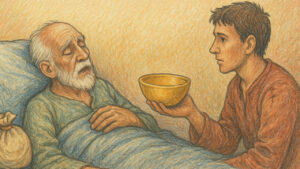Suffering from terminal spinal cancer at the age of 47, former North Carolina State basketball coach Jim Valvano spoke with a reporter earlier this year. He looked back on his life and told a story about himself as a 23-year-old coach of a small college team. “Why is winning so important to you?” the players asked Valvano.
“Because the final score defines you,” he said, “You lose, ergo, you are a loser. You win, ergo, you are a winner.”
“No,” the players insisted. “Participation is what matters. Trying your best, regardless of whether you win or lose; that is what defines you.”
It took 24 more years of living. It took the coach bolting up from the mattress three or four times a night with his T-shirt soaked with sweat and his teeth rattling from the fever chill of chemotherapy and the terror of seeing himself die repeatedly in his dreams. It took all that for him to say it: “Those kids were right. It is the effort, not the result. It is trying. God, what a great human being I could have been if I had had this awareness back then.”
This is an important truth in our earthly life. We cannot always win, although we always want to win. And of course, to be a winner is not the goal of our life. But to have this in mind is also important for our spiritual life, and more specifically for holiness.
Sometimes we see holiness as a victory. Yes, we could say it is a victory over sin. But, it is much more than that. And also, that vision could deceive us. It could deceive us because when we no longer commit mortal sin we will think that we have won the race for holiness and we don’t have to work for it any longer: this means mediocrity. Or on the other hand, if we see our venial sins, we would think that we will never be able to overcome sin and we will get discouraged in our spiritual combat. Both things will make us stop in our work for holiness.
Holiness on earth is not a matter of winning but rather a matter of trying our best. Holiness is a matter of constantly trying to achieve something that we cannot actually achieve, since we can always grow in holiness, since holiness is a gift from God. Chesterton says this in a different way: he says that holy are those who realize that they have a debt (an infinite debt) and they want to pay it. They know that they cannot pay their debt, but they are constantly trying their best to pay it.






